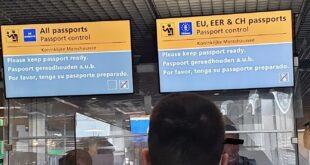A program to pay asylum applicants in Germany to return to their home countries, often before a decision is made on their status, has begun. The government wants to increase the number of people who choose to leave.
The program “StartHilfe Plus,” which loosely translates to “start help plus,” began on Wednesday, 1 February.
Administered by the Federal Office for Migration and Refugees (BAMF) in co-operation with the International Organization for Migration (IOM), the initiative aims to financially reward asylum applicants if they are willing to return to their homelands. About 40 million euros ($43 million) has been set aside for payments.
“In the year 2016 about 55,000 people voluntarily returned to their homelands – that’s an increase compared to the year before [about 35,000 in 2015]. We have good conditions [for another increase on voluntary returns] with our additional budget,” Jutta Cordt, who officially took over the leadership of BAMF on Wednesday, told DW.
BAMF is dealing with a backlog of some 430,000 unprocessed applications for asylum, something Cordt described as a “challenge.”
Incentives to leave quickly
Under the multi-tier system of “StartHilfe Plus,” people with little chance of being granted asylum in Germany would be rewarded for leaving, especially if they do so before their asylum application procedure has been completed.

People older than 12 who withdraw their asylum applications before their case is decided would receive 1,200 euros. People whose applications are rejected would receive 800 euros if they agreed not to appeal the decision and instead leave Germany before the end of a given time limit. Extra payments would apply for families and children under 12; there is also provision for migrants who have a “Duldung” or temporary permission to stay in Germany.
The program has several restrictions in place that aim to reduce the risk of the program being abused. People from certain countries or regions, including the western Balkans, are not eligible and applicants also have to be without their own funds. Syrian citizens cannot apply.
Criticism of ‘get lost’ bonus
The “Starthilfe” program has come under criticism, including from Diakonie, the social welfare organization of Germany’s Protestant churches.
An expert with the organization, Dietrich Eckeberg, said there was an “uncanny amount of political pressure” to steer as many people as possible toward voluntary departures.
“I find this regulation especially questionable, because it is designed to prevent the results of asylum applications being appealed through the courts,” Eckeberg said, adding that in reality, such “get lost” bonuses fuelled prejudice against migrants and refugees and were nothing more than window dressing which did not help reintegrate people in their countries of origin.
Cheaper than deportations
More than a million refugees and migrants arrived in Germany in the past two years. According to the results of a BAMF survey, a refugee’s travel to Germany cost about 7,100 euros and took 35 days on average.
While many who arrived following the perilous journey are entitled to refugee status because they fled war or persecution, those who came for economic or other reasons face having their asylum applications rejected and being sent back. Germany has also named a number of countries “safe countries of origin,” including Morocco, Tunisia and Algeria.
“For all those who have no prospect of staying in Germany, voluntarily departure represents a better way than deportation,” Interior Minister Thomas de Maiziere said.
For the government, paying migrants and refugees to return of their own accord pays off because deporting them is much more expensive. Other financial incentive programs for voluntarily returning migrants have long been in effect in Germany on a national and state level, as well programs at the EU level.
© Deutsche Welle│02.02.2017
 THE AFRICAN COURIER. Reporting Africa and its Diaspora! The African Courier is an international magazine published in Germany to report on Africa and the Diaspora African experience. The first issue of the bimonthly magazine appeared on the newsstands on 15 February 1998. The African Courier is a communication forum for European-African political, economic and cultural exchanges, and a voice for Africa in Europe.
THE AFRICAN COURIER. Reporting Africa and its Diaspora! The African Courier is an international magazine published in Germany to report on Africa and the Diaspora African experience. The first issue of the bimonthly magazine appeared on the newsstands on 15 February 1998. The African Courier is a communication forum for European-African political, economic and cultural exchanges, and a voice for Africa in Europe.
































